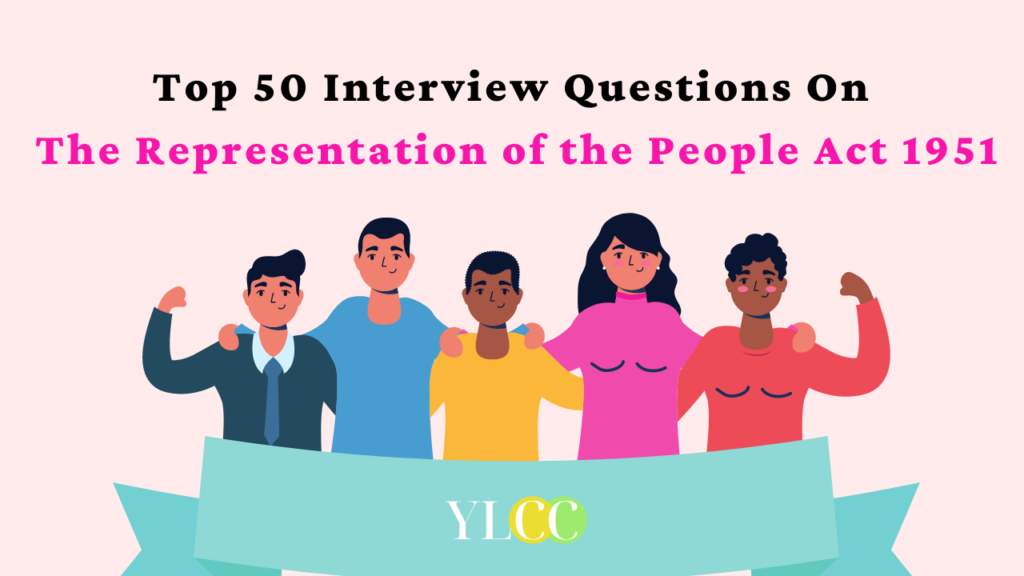
INTRODUCTION
The Parliament passed the Representation of People Act, 1951, in accordance with Article 327 of the Indian Constitution. This Act governs the election of the Houses of Parliament and Houses of the Legislature of each State and deals with the qualifications and disqualifications for membership of candidates in those Houses. It also deals with the code of conduct of elections, the resolution of doubts and disputes arising in connection with such elections. Several amendments have been made in this Act with regards to abolishing election tribunal, provisions for polling adjournment or countermanding, adding the Right to information, NRI voting rights, and much more.
In this article, Team YLCC brings you Top 50 Interview Questions On The Representation of People Act. Read on!
- What are the objectives of the Representation of the People Act 1951?
- Under the ambit of which Article the Representation of the People Act was enacted?
- Who had introduced this Act before the parliament?
- What are the important parts of this Act?
- What are the important functions of polling agents and counting agents?
- Can the people of unsound mind vote under this Act?
- What is the role of the Election Commission of India?
- Who is a “chief electoral officer”?
- What do you understand by the term “elector”?
- How can the appointment of counting agents be done?
- What is the required qualification for membership in a Legislative Council?
- What does “appropriate Government” mean?
- Under what circumstances a person can be disqualified under this Act?
- What does this Act say on the delegation of functions of the Election Commission?
- What are the duties of the presiding and polling officer?
- How can a candidate withdraw his candidature?
- What does the term “electronic media” includes?
- How can the appointment of polling agents be done?
- What are the consequences of non-attendance of polling or counting agents when attendance is required?
- Who has the authority to fix the hours during which the poll will be taken?
- In which section of this Act “booth capturing” is covered?
- What is the manner of voting at elections described in this Act?
- What do you understand by “voting machine” in this Act?
- Is the Right to vote covered under the ambit of this Act?
- How presentation of petitions is done under this Act?
- What is the required qualification to get membership in the Rajya Sabha?
- What does this Act say on reimbursement of expenses of witnesses?
- Can withdrawal of election petitions take place?
- How many amendments so far have been done to this Act?
- Can a convicted person contest election as per this Act?
- Can alteration of the constituencies take place under this Act?
- What is the Model Code of Conduct (MCC)?
- Is Bribery a corrupt practice as per this Act?
- What is the punishment for promoting enmity between classes in connection with the election?
- Are the election tribunals abolished?
- What is the position of the Act on the sale and distribution of alcoholic beverages during election season?
- When does a person become ineligible to contest for the Houses of Parliament or the Houses of the Legislature of a state?
- What does this Act say on punishment of non maintenance of Secrecy of voting?
- Are free supply of copies of electoral rolls permitted in this Act?
- What assets and liabilities the candidate is bound to declare under this Act?
- What are the functions of election agents?
- What is the required qualification to get membership of the Lok Sabha?
- What does the Act say about contributions to political parties in the form of money?
- How many places can a person contest elections from?
- What are the offences related to election discussed in this Act?
- What does the Act say about political parties’ election-related messages?
- Who is in charge of counting the votes and announcing the results?
- How many parts and sections does this Act contain?
- Which amendment made provisions for the adjournment or countermanding of polling?
- Do NRIs have voting rights?
YLCC would like to thank Anam Khan for her valuable insights in this article.







